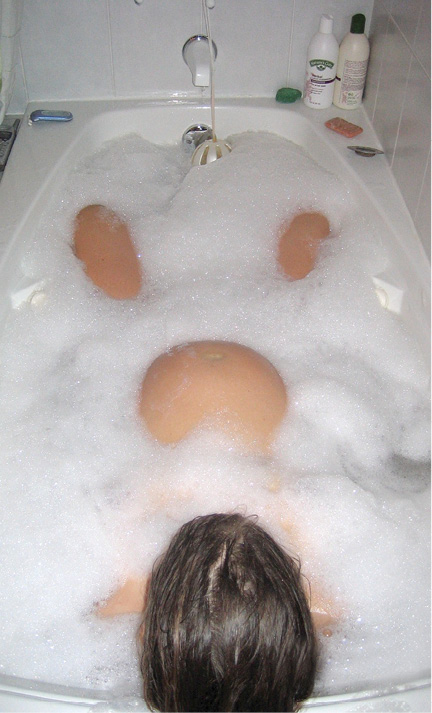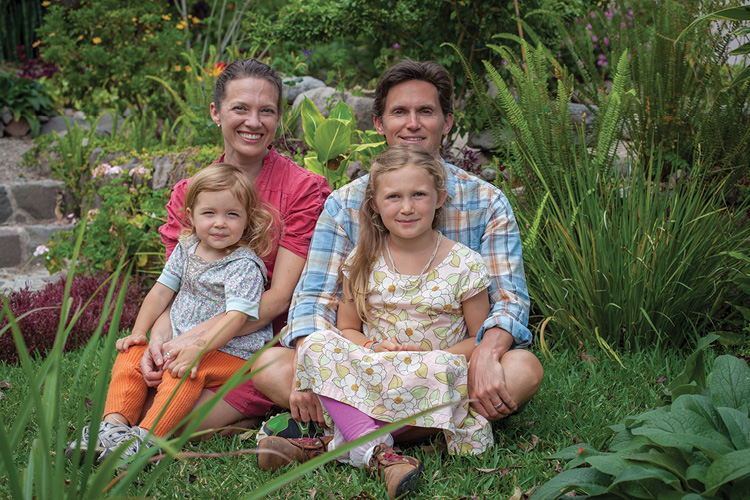Conclusion
Becoming a parent is a time of change, the degree of which is unprecedented in adult lives. The mother’s brain — and involved father’s — go through more changes than at any other time as adults. The more the brain changes, the easier parenting seems to be. Perhaps this is iconic for all of parenting: the more we are able to give over to the changes involved in parenting, the more our bodies will help. And help is what just about every parent can use. The world is moving faster than ever: new chemicals, new devices, and new worries are emerging faster than we can keep up. Yet our ancient biology is working hard to help us do exactly what we’ve always done: tune in to our children. In that tuning in, we find hope. Again and again, activists, scientists, and entrepreneurs have described the process of having children as a profound act of hope. Caring for the next generation brings parents, grandparents, and involved citizens together. It is not enough to make decisions that are good enough for today. Holding a new baby in our arms reminds us that we have so much more for which to live.
When I left nonprofit environmental work and started researching, writing, and teaching classes as The Green Mama, I discovered something profound. New parents care. They care about their health, about the environment, and about finding better food and better beauty care products. They care about their homes, their families, and their communities. Now I understand why we care so much. We are preprogrammed to care. Having a baby throws a switch in many of us, and we suddenly feel as if we can no longer put off those changes we know are for the best. We want there to be a better world so that our children don’t have to try so hard to become the happy, healthy, and free individuals we know they are destined to be.
As Dr. Bethany Hays, the obstetrician with over 30 years in practice, reminds us, “We don’t have babies with our brains.” In other words, reading is great (especially if, like me, reading makes you happy), but it’s something more primal that births and breastfeeds and guides us into parenting. How can you start to access and foster that part of you?
- Worry smarter. As parents we are biologically designed to worry about the obvious dangers: the bear that gets too near our home, the unwashed man on the bus trying to shake hands with our newborn, or the imagined kidnapper lurking around the corner from the playground. Yet in our modern world, these aren’t the major threats to our health and happiness. The threats facing us today are very often invisible: they are found in the long list of unpronounceable ingredients in that skin cream, and the dozens of different industrial chemicals added to our foods and smelling up the inside of our homes. As a new parent your brain will help you worry more, so use that worry well. Learn to read labels. Learn to ask better questions of the media, scientists, doctors, and politicians. Is it really proven safe? Who is paying for that study? Why aren’t you protecting the health of my children over the economics of a company? How is it possible that this product is so cheap? Is it really as convenient as it is made out to be? Is it really green?
- Start your new rhythm now. Kim John Payne, author of Simplicity Parenting, reminds parents that we all do better with a gentle rhythm uncluttered by too many activities and strengthened through consistency. In his experience, parents who start before their children are born enjoy the postpartum period more and have an easier adjustment. My first child is what some call “spirited” and others may call “sensitive.” I remember reading in Dr. Sears’s The Baby Book that these children are a blessing that force us to be better parents. It’s true. By the time my second came along, I went from a fly-by-the-seat-of-my-pants attitude to an upholder of rhythm. The principles that nurtured my sensitive child and gave me both much-needed time to myself and some predictability include no more than one activity a day (and that might be simply a bath for the first three months), for her to take at least one nap in her bed every day, and a consistent bedtime routine.
- Let your money be a symbol of your beliefs. We aren’t primarily consumers, we are citizens. Yet most of us spend money, and those dollars tell companies something. If possible, don’t tell a company you are willing to buy a product that isn’t proven safe, and don’t buy from a manufacturer that makes disingenuous claims. Ask yourself, “Will this new thing just be something to trip over in the middle of the night, or will it really help me care for myself and my family better?”
- Remember, you are what you eat and drink and what you rub on your skin and what you breathe in. And so is your baby. That principle alone sums up most of this book. When overwhelmed or confused by choices, this will help set you straight. If I am still confused, I usually think about my great-grandmother and what she would do.
- Birth matters. Not many people are likely to get exactly the birth they imagine. Yet research into what physiological birth looks like will help you imagine it more clearly and help you get a healthier birth with fewer interventions. Birth is both an ending and a beginning; everybody is happier when that transition is without trauma.
- The postpartum period deserves pre-planning. The more support and the less activity you have planned for the postpartum period, the better. Gather supplies beforehand and prepare to be pampered. Remember, no matter how much you love and want that baby, almost every mother will also struggle a bit during this time. The hormones and brain are going through tremendous transformation. You barely get any sleep. Everything is new, and it all seems to matter so, so much. It helps just to know that feeling all of this simply makes you human. It also helps if you take your cod liver oil and prenatal vitamins, and eat really nutritious food. Anytime you can sleep, sleep. Anything you can do lying down, do lying down. Anything that can be done sitting, sit. This is a time for recovery, not for getting back into those pre-pregnancy jeans. If you are so exhausted or depressed that you can’t do anything or if you have violent thoughts toward your child or yourself, these are signs that you would benefit from help from a medical professional with experience in postpartum depression. Postpartum depression is extremely common, so please don’t add shame to your list of burdens, and get the help you need.
- Do less and do what you love. There are so many worthwhile causes in which to get involved. There are so many activities for pregnant women, and even more for new parents and when your children get older. What to do? It might benefit you to know that there isn’t research to suggest that those really early lessons and classes benefit children in the ways that really matter: they aren’t smarter, happier, or even better socialized in the long run because they took baby ballet or infant music. Instead, do fewer things and prioritize your happiness and things you can do together. The research suggests that less frazzled mothers are happier mothers and happier mothers have happier children. I loved being with other new mamas who shared common interests after having my first baby. I loved leading Green Mama Cafes with new moms to discuss greening parenthood. I loved going door-to-door before an election with my baby strapped to my chest. But I didn’t love those bitchy and fear-inducing new-mom chat groups online and I didn’t love dragging my newborn to her older sister’s two-hour, three-days-a-week preschool. In hindsight I wish I would have skipped the latter stuff.
- Learn techniques to de-stress. Stress isn’t just something in your mind, and it isn’t just something you are (or aren’t) doing. Stress is strain, and it comes from the toxins in our environment, poor food, traffic, pollution, technology, and the stories that we tell ourselves. Our bodies will work better to digest that food, manage those toxins, and recover from the jerk cutting you off on the way to work if you have a way to relax. Try meditation, yoga, walking in nature, reading, doing jigsaw puzzles, colouring, painting, or taking warm (but not too hot when you’re pregnant) baths. All of these have proven de-stressing benefits! Don’t stop after you have the baby. Having a baby is stress-producing in the best of situations: hormones are fluctuating, the brain is changing rapidly, and you have to learn everything there is to know about a new being (or two). Give yourself a break! Literally, give yourself a break every day. Your baby won’t “break” if you leave her to sleep — or even cry — while you take a mental health minute (or fifteen). My sanity-saving activity when I was home with a newborn was scalding hot baths with Epsom salts: Ahhhhh!

- Create community locally. Start a playgroup or host a play date. Share green tips, babysitting duties, and meals. It will be easier to stay on your path if you don’t feel alone. And there are neurological benefits from being in community with other like-minded people.
- Be proactive. Take that minute to write or make a phone call to your political representative or a company about a product. Politicians act on what they hear their constituents demanding (and sometimes the other “side” is quite loud); companies can change dramatically if they know it matters to their customers. Even if the change you want doesn’t happen right away, just doing it makes it easier for you to do it the next time and sets an example for your child. Perhaps your playgroup will be just as interested as you in what you’re learning. Did you know in Canada you can send a postcard or letter with your concerns or kudos to the governor general, any member of the Senate and House of Commons, or the prime minister for free (no postage required)?

- Laugh and play more. Laughing is really good medicine for pregnant women, postpartum women, and children. What is your form of play? Online anything doesn’t count because the research suggests that it can rewire your brain, and not in a good way. Learn how to play for real, and teach your child that life is also fun.